#DelhiNCR hashtag
Text
Know More about Cervical Cancer
Cervical cancer poses a considerable threat to women globally, yet its impact can be mitigated through timely detection and proper treatment. This article aims to explore the multifaceted aspects of cervical cancer, covering symptoms, risk factors, prevention techniques, and treatment modalities. By delving into these intricacies, individuals can gain a comprehensive understanding of the disease, empowering them to take proactive measures for their health. Moreover, it underscores the significance of seeking care from leading cancer hospitals and specialists, one of the Best Cervical Cancer Hospital in Ghaziabad such as GS Cancer Hospital in Ghaziabad. With its state-of-the-art facilities and experienced medical professionals, GS Cancer Hospital offers comprehensive and effective management of cervical cancer. From advanced diagnostic techniques to personalized treatment plans, including surgery, chemotherapy, and radiation therapy, patients can receive tailored care to combat the disease. One of the Best Cancer Hospital in Hapur like GS Cancer Hospital, this article aims to raise awareness about cervical cancer and encourage women to prioritize regular screenings and early intervention for better outcomes.
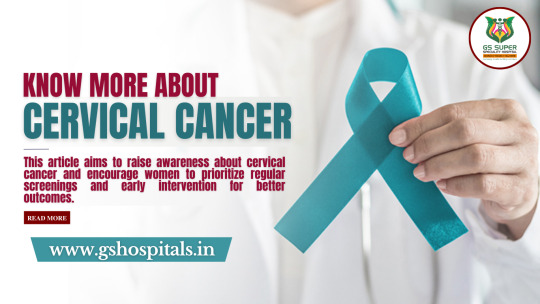
Understanding Cervical Cancer:
Cervical cancer is a malignancy originating from the cells of the cervix, the lower portion of the uterus that links to the vagina. Typically, the disease initiates with abnormal alterations in cervical cells, referred to as precancerous lesions. Without intervention, these precancerous lesions can evolve into cancerous growths. Cervical cancer is primarily caused by persistent infection with high-risk strains of the human papillomavirus (HPV), a sexually transmitted infection. The progression from precancerous lesions to invasive cancer often occurs over several years, providing a window of opportunity for early detection and intervention. Regular screening tests, such as Pap smears and HPV tests, are pivotal in identifying abnormal cervical changes at an early stage when treatment is most effective. Additionally, vaccination against HPV can significantly reduce the risk of developing cervical cancer.
Recognizing Symptoms of Cervical Cancer:
Abnormal Vaginal Bleeding: Cervical cancer may cause irregular vaginal bleeding, including bleeding between menstrual periods, after sexual intercourse, or post-menopause. This bleeding can manifest as spotting or heavier bleeding than usual.
Pelvic Pain or Discomfort: Women with cervical cancer may experience persistent pelvic pain or discomfort, which can range from mild to severe and may be constant or intermittent.
Pain during Intercourse: Some individuals with cervical cancer report experiencing pain or discomfort during sexual intercourse, known as dyspareunia. This discomfort can arise due to the presence of tumors or inflammation in the cervix.
Changes in Vaginal Discharge: Cervical cancer may cause alterations in vaginal discharge, which may appear watery, bloody, or have a foul odor. These changes in discharge can occur unrelated to menstrual periods and persist over time.
It's important to note that early-stage cervical cancer may not always present with noticeable symptoms, underscoring the significance of regular screening tests for early detection. Any persistent or concerning symptoms should prompt prompt evaluation by a healthcare professional for further assessment and appropriate management.
Understanding Risk Factors for Cervical Cancer:
Human Papillomavirus (HPV) Infection: HPV infection, especially with high-risk strains like HPV 16 and HPV 18, is the primary risk factor for cervical cancer. HPV is a common sexually transmitted infection that can cause abnormal changes in cervical cells, increasing the likelihood of cancer development.
Smoking: Tobacco use, including smoking cigarettes and exposure to secondhand smoke, elevates the risk of cervical cancer. Smoking can weaken the immune system, making it less effective in combatting HPV infections and increasing susceptibility to cervical cancer.
Weak Immune System: Women with compromised immune systems, such as those with HIV/AIDS or individuals taking immunosuppressive medications, face an increased risk of cervical cancer. A weakened immune system is less capable of recognizing and clearing HPV infections, allowing for the progression to cervical cancer.
Lack of Regular Screening: Failure to undergo routine cervical cancer screening, including Pap tests and HPV tests, raises the risk of late-stage diagnosis and poorer outcomes. Regular screening enables the early detection of precancerous changes in cervical cells, facilitating prompt intervention and prevention of cervical cancer.
Prevention and Early Detection Strategies:
HPV Vaccination: Vaccination against HPV is a highly effective preventive measure against cervical cancer. The HPV vaccine is recommended for girls and boys aged 9 to 26 years to guard against infection with high-risk HPV strains, reducing the risk of cervical cancer development.
Regular Screening: Regular cervical cancer screening, encompassing Pap tests and HPV tests, plays a pivotal role in detecting precancerous cervical changes early. Early detection allows for timely intervention, including monitoring or treatment, to prevent the progression to invasive cervical cancer.
By understanding and addressing these risk factors and adopting preventive measures such as HPV vaccination and regular screening, individuals can significantly reduce their risk of developing cervical cancer. Additionally, early detection through screening offers the opportunity for timely intervention, ultimately improving outcomes and reducing the burden of cervical cancer on public health.
Exploring Treatment Options for Cervical Cancer:
Surgery: Surgery is a common treatment modality for early-stage cervical cancer, aiming to remove the tumor and surrounding tissue. Various surgical procedures may be employed based on the cancer's stage and extent. These may include:
Cone Biopsy: A cone-shaped piece of tissue containing the abnormal cells is removed from the cervix.
Hysterectomy: Surgical removal of the uterus, cervix, and sometimes nearby tissues, such as ovaries and fallopian tubes.
Lymph Node Dissection: Removal of lymph nodes in the pelvic area to assess if cancer has spread.
Radiation Therapy: Radiation therapy utilizes high-energy beams to target and destroy cancer cells, effectively shrinking tumors. It may be employed as a primary treatment for cervical cancer or in combination with surgery (adjuvant radiation) or chemotherapy (chemoradiation). There are two main types of radiation therapy:
External Beam Radiation: Beams are directed at the cancer from outside the body.
Brachytherapy: Radioactive sources are placed inside the body near the tumor site.
Chemotherapy: Chemotherapy involves the administration of drugs to kill cancer cells or inhibit their growth. It may be utilized as a standalone treatment or in combination with other therapies. Chemotherapy drugs can be given before surgery (neoadjuvant chemotherapy), after surgery (adjuvant chemotherapy), or concurrently with radiation therapy (chemoradiation). Chemotherapy is often recommended for advanced or metastatic cervical cancer.
Targeted Therapy: Targeted therapy is a newer treatment approach that targets specific molecular abnormalities within cancer cells. Drugs such as bevacizumab may be used to block the formation of new blood vessels, inhibiting tumor growth and spread. Targeted therapy may be combined with other treatments for advanced cervical cancer.
Immunotherapy: Immunotherapy harnesses the body's immune system to recognize and attack cancer cells. Checkpoint inhibitors, such as pembrolizumab, may be used to enhance the immune response against cervical cancer cells. Immunotherapy is typically reserved for recurrent or metastatic cervical cancer.
Clinical Trials: Participation in clinical trials offers access to innovative treatment approaches and investigational therapies. Clinical trials evaluate new drugs, treatment combinations, and therapeutic strategies for cervical cancer, potentially leading to advancements in treatment efficacy and patient outcomes.
By considering these treatment options in consultation with a multidisciplinary team of healthcare professionals, individuals diagnosed with cervical cancer can make informed decisions about their care and pursue the most appropriate and effective treatment plan tailored to their specific disease characteristics and preferences.
GS Cancer Hospital Ghaziabad stands as a beacon of hope for individuals battling cancer, offering a holistic approach to cancer care with a focus on excellence, compassion, and innovation. With a commitment to providing cutting-edge treatments and personalized care, the hospital has emerged as a premier destination for patients seeking comprehensive cancer care services.
Why Choose GS Cancer Hospital?
State-of-the-Art Facilities: Best Oncologist in Meerut at GS Cancer Hospital is equipped with state-of-the-art infrastructure and advanced medical technology to support the diagnosis, treatment, and management of various types of cancer, including cervical cancer. From modern diagnostic imaging facilities to advanced radiation therapy and surgical suites, the hospital ensures that patients have access to the latest medical advancements.
Comprehensive Cancer Care Services: The hospital offers a comprehensive range of cancer care services tailored to meet the unique needs of each patient. This includes multidisciplinary treatment approaches, such as surgery, radiation therapy, chemotherapy, immunotherapy, and targeted therapy, delivered by a team of highly skilled healthcare professionals.
Experienced Oncologists: Cancer Specialist in Ghaziabad at GS Cancer Hospital, patients benefit from the expertise of renowned oncologists specializing in the diagnosis and treatment of cervical cancer and other malignancies. The hospital's team of oncologists, surgeons, radiation oncologists, medical oncologists, and support staff work collaboratively to develop individualized treatment plans that prioritize patient well-being and outcomes.
Patient-Centric Approach: The hospital prioritizes patient comfort, safety, and satisfaction, aiming to provide a healing environment conducive to optimal recovery. From compassionate care coordinators to dedicated patient support services, GS Cancer Hospital ensures that patients and their families receive the support and guidance they need throughout their cancer journey.
Research and Innovation: GS Cancer Hospital is committed to advancing cancer research and innovation to improve treatment outcomes and quality of life for cancer patients. Through participation in clinical trials, research initiatives, and academic collaborations, the hospital remains at the forefront of oncology advancements, offering patients access to novel therapies and treatment options.
Conclusion
In conclusion, cervical cancer is a significant health issue that requires attention and proactive measures for prevention, early detection, and treatment. Understanding the risk factors, symptoms, and available prevention strategies is essential for reducing the burden of this disease. GS Hospital, with its commitment to education, prevention, and comprehensive care, plays a crucial role in the fight against cervical cancer. By promoting awareness, providing access to screening and vaccination, and delivering high-quality treatment and support services, we can work towards reducing the incidence and mortality rates of cervical cancer, ultimately improving the health and well-being of women in our communities. Together, let us continue to strive for a world where cervical cancer is preventable, treatable, and ultimately eradicated.
#BestCancerHospital hashtag#CervicalCancer hashtag#Awareness hashtag#GSHospital hashtag#DelhiNCR hashtag#UttarPradesh hashtag#India
0 notes
Text

#PayDayLoan #AdvanceSalaryLoan #EarlySalaryLoan #KYCLoan #UdyamLoan #EmergencyLoan #SalaryAdvance
#CreditCard #loan #EducationLoan #DelhiNCR #Kolkata #PANIndia #CIBIL #insurance #job #jobs #visa #PrivateFinance #SameDayLoan
#AadharCardSeLoan #PANCardSeLoan
9716435611
8902381747
0 notes
Text
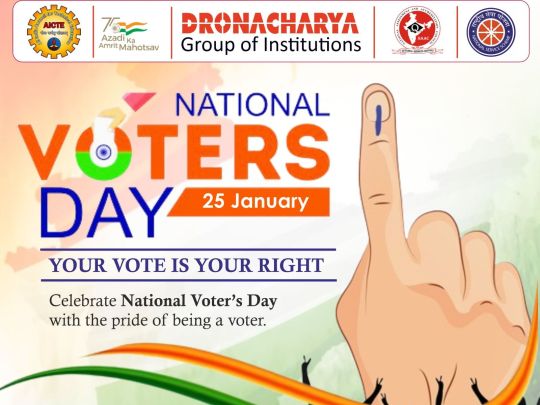
Celebrating National Voter’s Day with a pride of being a voter.
National Voters' Day is dedicated to promoting awareness about the importance of voting and encouraging eligible citizens to exercise their right to vote.
hashtag#NationalVotersDay
hashtag#YouthEmpowerment
hashtag#RightToVote
hashtag#awareness
hashtag#voting
hashtag#votingmatters
hashtag#democracy
hashtag#Education
hashtag#engineeringcollege
hashtag#g20india
hashtag#cbseboard2024
hashtag#delhincr
hashtag#aicte
hashtag#topprivateengineeringcollegeingreaternoida
hashtag#DronacharyaGroupofInstitutions
hashtag#BestEngineeringCollege
hashtag#BestEngineeringCollegeinDelhiNCR
hashtag#multipleplacement
0 notes
Text
FDP at KCC Institute of Legal and Higher Education Greater Noida
KCC Institute of Legal and Higher Education organized a one-week Faculty Development “EMERGING TRENDS IN TEACHING PEDAGOGY” from 25th-29th November 2019. The inaugural session of the 2nd FDP of KCCILHE on “Emerging Trends in Teaching Pedagogy” was honored by Prof. (Dr.) K.K Aggarwal, Chairman NBA and the guest speaker for the session was Prof. (Dr.) J.S Gujral, Ex- Prof. Delhi University. Prof (Dr.) Bhavna Agarwal Director, KCCILHE gave an enlightening welcome speech that marked as the beginning of the day. The gathering was then uplifted by the motivating words of Dr. Gujral who focused on the attitude and the skills that are required for being an efficient teacher. Later, Dr. K. K. Aggarwal illuminated the audience by acknowledging different ways in which a management teacher should deal with daily problems. He suggested that management is all about finding the best solutions among the variety of solutions available to a problem because a single problem can have different solutions according to the day, time and place.
#kcc hashtag#kccinstitutes hashtag#kcciilhe hashtag#kccitm hashtag#ggsipu hashtag#ipuniversity hashtag#aktu hashtag#bba hashtag#bca hashtag#bajmc hashtag#bcomh hashtag#btech hashtag#delhincr hashtag#greaternoida hashtag#FDP
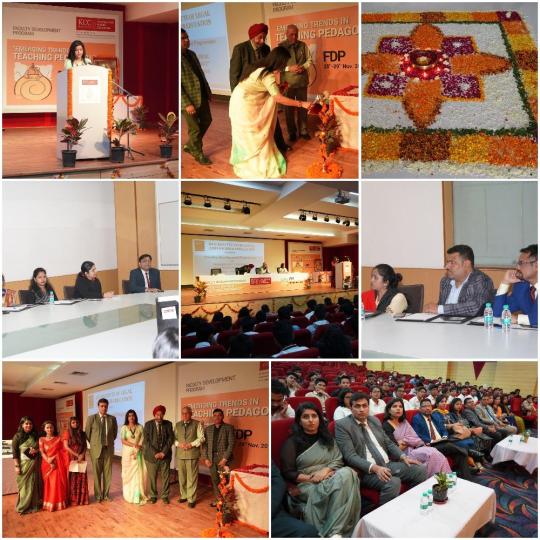
14 notes
·
View notes
Photo

New Delhi declared the third best capital city for holiday, according to a study New Delhi has been placed in the third position as the best capital city for a holiday, according to a study conducted by luggage storage firm, Bounce. The world-wide study included 69 capital cities across the world. It has been reported that the study looked at certain factors to come to the inclusion. These include, cost of hotel and transport; number of attractions; restaurants; and average temperatures and rainfall. New Delhi has been ranked among other world capitals such as Valletta, the capital of Malta, which is on the top position, and Abu Dhabi, which is on the second spot. Valletta earned 6.74 points out of 10, Abu Dhabi earned 6.24 points, while New Delhi on third spot earned 6.6 points. It was found that New Delhi has a total of 12409 cities. According to the study, the average cost of hotel in the city for a night is USD 101.87, around USD 35 less than the average cities of all cities. According to a statement by Cody Candee, CEO and Founder of Bounce, “India’s capital New Delhi ranks as the third best capital city for tourists in our study. Rich in history and culture, architecturally beautiful and an amazing place to shop, it is not surprising that New Delhi ranked in the top three capital cities to visit on vacation." Valletta was declared the capital city with the highest number of attractions, and restaurants, while Luxembourg City was found to have the cheapest public transport. London was judged as the most Instagrammable city in the world, with 151 million hashtag mentions. Paris on the other hand had 120 million hashtag mentions on Instagram. #delhi #delhitourism #delhigram #delhidiaries #india #delhiblogger #incredibleindia #travelphotography #newdelhi #travel #delhiphotography #delhincr #photography #diaries #delhivibes #sodelhi #delhiwale #gram #delhicapitals #indiagate #delhinightlife #delhibloggers #delhifashionblogger #instagood #delhiscenes #olddelhi #redfort #delhigirl #delhifood (at New Delhi) https://www.instagram.com/p/CViztPahiLd/?utm_medium=tumblr
#delhi#delhitourism#delhigram#delhidiaries#india#delhiblogger#incredibleindia#travelphotography#newdelhi#travel#delhiphotography#delhincr#photography#diaries#delhivibes#sodelhi#delhiwale#gram#delhicapitals#indiagate#delhinightlife#delhibloggers#delhifashionblogger#instagood#delhiscenes#olddelhi#redfort#delhigirl#delhifood
1 note
·
View note
Video
"No Road Is Long With Good Company"🏎😎 . Note : Noida is a planned city in India’s northern state of Uttar Pradesh. The riverside Okhla Bird Sanctuary is home to migratory and native birds, plus jackals and butterflies. (wiki) . 📍 location : Noida City in Uttar Pradesh . Video Credit @december_born07 . To get featured on our page use our official hashtag #Chaloचलें & tag us @chalochale529 . Congratulations on being featured on our page . Follow : @chalochale529 #goastateofmind #noida #delhi #mumbai #india #gurgaon #haryana #greaternoida #gurugram #punjab #instagram #chandigarh #delhincr #newdelhi #pune #kolkata #jaipur #chennai #ncr #bangalore #up #faridabad #noidadiaries #noidagram #gurjar #follow #ghaziabad #roads #roadtrip https://www.instagram.com/reel/CQGOxqAgMs3/?utm_medium=tumblr
#chaloचलें#goastateofmind#noida#delhi#mumbai#india#gurgaon#haryana#greaternoida#gurugram#punjab#instagram#chandigarh#delhincr#newdelhi#pune#kolkata#jaipur#chennai#ncr#bangalore#up#faridabad#noidadiaries#noidagram#gurjar#follow#ghaziabad#roads#roadtrip
0 notes
Photo
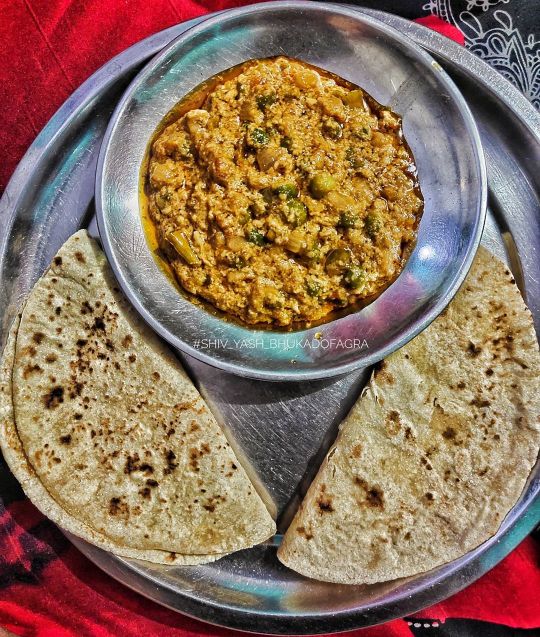
Ghar ka swadisht lunch ek dum swarg walli feeling 😉🤟😉 . Lunch menu - khoya muttor & maa ka pyar roti 😅 . Use hashtags #shiv_yash_bhukadofagra & #bhukkadofagra _🏧_ story ki सुर्ख़ियो मै आना अनिवार्य है 🍺🍻🍺🥂🍻 . . #lunchboxlove #ghar #homefood #homefoodie #mother #motherlove #momblogger #mommade #motherearth #memesdaily #foodieadventures #foodiesofig #foodforthesoul #feedfeedvegan #hkfoodblog #jaipurwali❤️ #delhincr #agra #foodporn #bloggerfashion #foodielifestyle #khoya #gharkakhana (at Smart City Agra) https://www.instagram.com/p/CCYWvC0lKT9/?igshid=hat8wikhwbi6
#shiv_yash_bhukadofagra#bhukkadofagra#lunchboxlove#ghar#homefood#homefoodie#mother#motherlove#momblogger#mommade#motherearth#memesdaily#foodieadventures#foodiesofig#foodforthesoul#feedfeedvegan#hkfoodblog#jaipurwali❤️#delhincr#agra#foodporn#bloggerfashion#foodielifestyle#khoya#gharkakhana
0 notes
Text
The kitchen is the heart of every home

#holidayinstudio hashtag#studio hashtag#hotels hashtag#hotelnstudio hashtag#shibabratabhaumik hashtag#shibabrata hashtag#bhaumik hashtag#hotelsindelhincr hashtag#studioindelhincr hashtag#couplesstudio hashtag#bachelorsstudio hashtag#familystudio hashtag#petfriendlystudio hashtag#studioappartment hashtag#picoftheday hashtag#delhincr hashtag#india hashtag#photooftheday hashtag#business hashtag#startup hashtag#finance hashtag#like hashtag#followme hashtag#like4like hashtag#instamood hashtag#follow hashtag#followme hashtag#followus https://hotelnstudio.com/ https://lnkd.in/fj6pPAY HotelnStudio Shibabrata Bhaumik
#shibabratabhaumik#Shibabrata Bhaumik#shibabrata#bhaumik#payq#high risk payment gateway#high risk merchant account#owner of payq
0 notes
Photo

Celebrate this Independence day at Nag Tibba Trek ----------------------------------------------------------------- Come with your group and we will give you best experience of trekking and camping. -------------------------------------------------------------- Trek is not only an adventure activity, you can learn brotherhood, Team work, sharing and caring. In the city life you might be hesitate to speak others, but in trek you are outspoken and share your story like a storyteller. This is not end here, you sing together, walk together,sit together, eat together, which helps to make your bond stronger. Feel the brotherhood on this Independence Day. From Noida to Noida package Contact us: [email protected] WhatsApp: 9899557643 Follow us: @tripyuga Use hashtag: #tripyuga #independenceday #nagtibba #uttarakhand #delhibloggers #delhincr #gurgaonblogger #trekk #camping #bonfire https://www.instagram.com/p/B0VT87_pTZB/?igshid=1y0d589msg4rj
#tripyuga#independenceday#nagtibba#uttarakhand#delhibloggers#delhincr#gurgaonblogger#trekk#camping#bonfire
0 notes
Text
Knowing the Difference: A Heart Attack & Cardiac Arrest Can Save Your Life
Heart-related emergencies, including heart attacks and cardiac arrests, pose life-threatening risks when not promptly addressed. Though often conflated, these conditions vary significantly in their etiology, symptoms, and treatment modalities. Distinguishing between a heart attack and cardiac arrest is crucial for prompt recognition, timely medical intervention, and potentially life-saving measures. This article aims to elucidate the disparities between heart attacks and cardiac arrests, equipping readers with essential knowledge to discern symptoms accurately and respond effectively in emergencies.
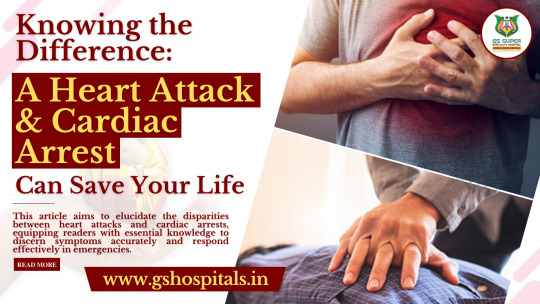
Delve into Your Heart's Inner Workings
Anatomy and Function: The heart is a unique muscular organ responsible for pumping blood throughout the body. It receives oxygenated blood from the lungs and pumps it to various organs and tissues via the circulatory system.
Coronary Arteries: Specialized blood vessels called coronary arteries supply the heart muscle with oxygen and nutrients essential for its proper functioning. These arteries ensure that the heart receives the necessary resources to sustain its pumping action.
Two-Pump System: The heart is divided into two distinct pumps: the right side and the left side. These pumps work in tandem to facilitate blood circulation throughout the body.
Right Side Function: Deoxygenated blood from the body returns to the heart's right side, where it is pumped to the lungs for oxygenation. This process enables the removal of carbon dioxide and the replenishment of oxygen in the blood.
Left Side Function: Oxygen-rich blood from the lungs enters the heart's left side and is subsequently pumped to all parts of the body, including vital organs and tissues. This ensures that every cell receives the necessary oxygen and nutrients for optimal function.
Continuous Circulation: The heart's rhythmic pumping action ensures a continuous flow of blood throughout the body, supplying oxygen and nutrients to various tissues and organs. This constant circulation supports overall vitality and enables efficient bodily functions.
Maintenance of Energy: By efficiently delivering oxygen and nutrients to tissues and organs, the heart sustains energy levels and promotes overall well-being. This continuous nourishment enables individuals to remain active and perform daily tasks with vigor and vitality.
What is a Heart Attack?
A heart attack, clinically referred to as a myocardial infarction (MI), transpires when blood flow to a segment of the heart becomes obstructed, typically due to a blood clot. This obstruction impedes the delivery of oxygen and nutrients to the heart muscle, resulting in tissue damage or necrosis if not promptly addressed. It is imperative to recognize the symptoms of a heart attack, such as chest pain or discomfort, shortness of breath, nausea, and lightheadedness, and seek immediate medical assistance to mitigate the risk of complications and minimize cardiac damage. Early intervention, including thrombolytic therapy or percutaneous coronary intervention (PCI), can help restore blood flow to the affected area and salvage myocardial tissue, enhancing the prognosis and reducing the likelihood of long-term cardiac impairment.
Causes of Heart Attack
Several factors can precipitate a heart attack, each contributing to the disruption of blood flow to the heart muscle.
Atherosclerosis: The accumulation of plaque within the arteries narrows the vessel lumen, impeding the smooth flow of blood and increasing the risk of clot formation.
Coronary Artery Spasm: Sudden contractions or spasms of the coronary arteries can restrict blood flow to the heart, triggering a heart attack.
Blood Clot Formation: Thrombosis, or the formation of a blood clot within a coronary artery, obstructs blood flow and leads to myocardial ischemia and infarction.
Coronary Artery Dissection: A tear or separation within the layers of a coronary artery can impede blood flow, precipitating a heart attack.
These underlying causes underscore the importance of risk factor modification and preventive measures to mitigate the incidence of heart attacks. Early recognition and intervention are crucial for minimizing cardiac damage and optimizing patient outcomes.
Symptoms of a Heart Attack
Recognizing the symptoms of a heart attack is crucial for prompt medical intervention and potentially life-saving treatment.
Chest Pain or Discomfort: The hallmark symptom of a heart attack, chest pain or discomfort may manifest as tightness, pressure, squeezing, or burning sensations in the chest area.
Pain or Discomfort in the Upper Body: Pain or discomfort may radiate to the arms, shoulders, neck, jaw, or back, often accompanying chest discomfort.
Shortness of Breath: Difficulty breathing or shortness of breath can occur, often accompanied by chest discomfort or independently.
Nausea, Vomiting, or Lightheadedness: Some individuals may experience nausea, vomiting, or feelings of lightheadedness, particularly in conjunction with other symptoms.
Cold Sweat: Profuse sweating, especially cold sweats, may occur during a heart attack episode, often accompanying other symptoms.
Prompt recognition and appropriate action in response to these symptoms can significantly improve outcomes for individuals experiencing a heart attack.
Treatment for Cardiac Arrest
Cardiopulmonary Resuscitation (CPR): CPR is a crucial first aid measure performed to manually pump blood and oxygen to vital organs, including the brain and heart, in cases of cardiac arrest.
Defibrillation: Defibrillation involves the use of an electrical shock to restore normal heart rhythm by depolarizing the heart muscle. This procedure is often performed using a defibrillator device.
Advanced Cardiac Life Support (ACLS): ACLS encompasses a range of advanced medical interventions administered to stabilize and support individuals experiencing cardiac arrest. These measures may include the administration of medications to restore cardiac function, airway management to ensure adequate oxygenation, and other interventions tailored to the individual's condition.
Early initiation of these treatments, particularly CPR and defibrillation, significantly improves the chances of survival and reduces the risk of complications associated with cardiac arrest.
The Link between Heart Attack and Cardiac Arrest
Association: There is a clear association between heart attacks and cardiac arrests. Sudden cardiac arrest can occur either during a heart attack or during the recovery period following a heart attack.
Risk Factor: The risk of experiencing cardiac arrest is heightened in individuals who have suffered a heart attack. However, it is essential to note that not all heart attacks lead to cardiac arrest. While heart attacks can increase the risk of cardiac arrest, they do not always culminate in this life-threatening event.
Other Heart Conditions: Additionally, other heart conditions can also lead to cardiac arrest, not just heart attacks. These conditions may include cardiomyopathy, heart failure, ventricular fibrillation, and long Q-T syndrome. In some cases, blockages in the coronary arteries may contribute to the development of these conditions, further highlighting the interconnected nature of heart health issues.
Symptoms of Cardiac Arrest:
Sudden Loss of Consciousness: One of the primary symptoms of cardiac arrest is a sudden loss of consciousness. The individual may collapse unexpectedly, without any prior warning signs.
Absence of Breathing: During cardiac arrest, the person may stop breathing altogether. This cessation of breathing is a critical indicator of the severity of the condition.
Lack of Pulse: Another significant symptom of cardiac arrest is the absence of a pulse. When checking for a pulse at the wrist or neck, there may be no detectable heartbeat.
Potential Consequences: If left untreated, cardiac arrest can lead to death. It is crucial to seek immediate medical attention to initiate life-saving treatment measures.
Causes:
Coronary Heart Disease (CHD): The primary cause of heart attacks, and subsequently, cardiac arrests, is coronary heart disease (CHD). CHD occurs when fatty deposits accumulate in the coronary arteries, impeding the flow of oxygen-rich blood to the heart.
Risk Factors: Individuals at higher risk of developing CHD include smokers, excessive alcohol consumers, those with an unhealthy diet rich in saturated fats, individuals with diabetes, overweight individuals, older adults, and those exposed to pollution. Additionally, a family history of heart disease can also predispose individuals to develop CHD.
Prevention:
Healthy Eating Habits: Avoiding junk food and adopting a diet rich in green vegetables, fruits, lean proteins, and whole grains can help prevent the development of CHD.
Regular Exercise: Engaging in regular physical activity helps maintain cardiovascular health, reduces body fat, and promotes overall well-being.
Hydration: Drinking an adequate amount of water daily helps flush out toxins from the body and supports optimal heart function.
Routine Check-ups: Regular health check-ups with a healthcare professional enable early detection of potential heart issues and facilitate timely intervention.
Emergency Response: In the event of suspected cardiac arrest or heart attack symptoms, it is imperative to call emergency services immediately. Prompt medical attention can significantly improve the chances of survival and minimize long-term complications.
Top Heart Care Hospitals in UP
When it comes to cardiovascular care and treatment, Uttar Pradesh boasts some of the top heart care hospitals in the region. Among these, Best Heart Care Centre in Meerut at GS Hospital in Ghaziabad stands out as a premier institution dedicated to providing exceptional cardiac care services.
Why Choose GS Hospital?
Top Heart Care Hospital in UP at GS Hospital in Ghaziabad is a distinguished healthcare facility known for its commitment to excellence in cardiac care. Here are some compelling reasons why it is a top choice for patients seeking heart-related treatment:
Comprehensive Cardiac Care Services: Best Hospital in Hapur at GS Hospital offers a comprehensive range of cardiac care services, covering diagnosis, treatment, and follow-up care for various heart conditions. From advanced diagnostic tests to cutting-edge interventional procedures and surgeries, the hospital provides holistic care under one roof.
State-of-the-Art Facilities: Equipped with state-of-the-art infrastructure and modern medical technology, GS Hospital ensures the delivery of high-quality cardiac care services. The hospital features advanced cardiac catheterization labs, cardiac imaging facilities, and specialized cardiac intensive care units (ICUs) to cater to the diverse needs of patients.
Experienced Cardiologists: Top Heart Care Hospital in Ghaziabad at GS Hospital, a team of experienced cardiologists, cardiac surgeons, and healthcare professionals collaborate to deliver personalized care to each patient. With their expertise and dedication, they strive to achieve optimal outcomes and improve the overall well-being of patients.
Wide Range of Treatment Options: Whether it's managing common heart conditions like hypertension and coronary artery disease or performing complex cardiac surgeries, GS Hospital offers a wide spectrum of treatment options tailored to meet individual patient needs. From medication management to minimally invasive procedures and cardiac rehabilitation programs, the hospital ensures comprehensive care at every step of the treatment journey.
Patient-Centric Approach: With a patient-centric approach, GS Hospital prioritizes the comfort, safety, and satisfaction of patients. From the moment they step into the hospital to post-discharge follow-up care, patients receive compassionate support and guidance from the dedicated healthcare team.
#HeartAttack hashtag#CardiacArrest hashtag#SaveYourLife hashtag#GSHospital hashtag#DelhiNCR hashtag#UttarPradesh hashtag#India
0 notes
Photo

#duggi #hashtag #delhiite #delhiites #delhi #delhincr #delhidiaries #saynotodrugs #nodrugs #dilli #dilliwale (at Delhi)
0 notes
Text

On Netaji Subhas Chandra Bose Jayanti, Dronacharya Group of Institutions, Greater Noida pays tribute to a visionary leader! Embracing his passion for education,let's illuminate minds and honour his commitment to education by fostering a culture of learning and leadership.Wishing you a day filled with wisdom and courage.
hashtag#NetaJiSubhashChandraBose hashtag#Netaji hashtag#SubhashChandraBose hashtag#courage
hashtag#leaders
hashtag#tribute
hashtag#leadership
hashtag#wisdom
hashtag#students
hashtag#peace
hashtag#occasion
hashtag#g20
hashtag#aicte
hashtag#g20
hashtag#cbseboard
hashtag#delhincr
hashtag#aktu
hashtag#engineeringcollege
hashtag#topprivateengineeringcollegeingreaternoida
hashtag#bestengineeringcollegeindelhincr
hashtag#DronacharyaGroupofInstitutions
hashtag#multipleplacement
hashtag#greaternoida
hashtag#uttarpradesh
0 notes
Photo

#weddmode #wedding #weddingphotography #shoottime📷 #instagood #dronestagram #dronephotography #drone #dronefly #droner #hashtag #photography #dji #djiphantom4pro #phantom #picoftheday #sharewizu #weddingtime #shoot #instagrampic #insta #instagram #facebook #delhincr #delhite #delhi (at Tivoli Gardens Chattarpur Road New Delhi)
#dronefly#dji#hashtag#phantom#wedding#droner#djiphantom4pro#instagood#photography#sharewizu#insta#shoot#shoottime📷#dronephotography#weddingphotography#facebook#weddmode#delhincr#instagrampic#drone#delhite#picoftheday#weddingtime#instagram#dronestagram#delhi
0 notes
Photo

Weekend Contest Alert !
Tag someone you would love to have a #Safecation with and tell us what you missed the most about hanging out with them in the comment section.
Win a 30% OFF discount on our #Staycation Package at Regenta Central Cassia.
Here’s how to participate:
- Like this post and our page.
- Tag someone and explain why you want to spend a staycation with them.
- Use the hashtags #SafecationAtRegenta and #RegentaCentralCassia.
The winner will be announced on 19th June.
Hurry, #ParticipateNow to be the lucky winner!
#Contest #ContestAlert #Prize #ContestGram #ContestsIndia #Staycation #LuxuryHotel #Travel #Win #WeekendContest #NewDelhi #Gurgaon #Noida #DelhiNCR #Delhi #Chandigarh #ZirakpurHotels #RegentaHotels #CovidSafeHotels
0 notes
Photo

Identify this supercar and comment with your answers. Three lucky participants stand a chance to win gift vouchers worth Rs 3000/- each at Smaaash Vasant Kunj. Don't forget to insert hashtag #DreamCarsAtAmbience in your answers. #BigBoyToyz #AmbienceVasantKunj - - - - - - - #delhilife #delhicity #delhiblogger #delhidiary #delhidiaries #delhi_igers #delhiigers #delhincr #delhiite #delhibllog #delhistyle #shopping #shoppingspree #fashion #fashionist #fashionblogger #fashionstyle #Gurgaon #gurgaongram #gurgaonigers #gurgaoncity #gurgaondiary #gurgaondiaries #guraonblogger #gurgaonlife #gurgaoncity #gurgaonconnect (at Ambience Mall, Vasant Kunj)
#dreamcarsatambience#gurgaondiary#delhilife#delhidiaries#shoppingspree#delhidiary#shopping#delhibllog#fashionstyle#gurgaonconnect#ambiencevasantkunj#guraonblogger#delhicity#delhiigers#bigboytoyz#gurgaoncity#fashionblogger#delhiblogger#delhiite#gurgaonlife#fashion#delhincr#delhi_igers#fashionist#delhistyle#gurgaondiaries#gurgaon#gurgaongram#gurgaonigers
0 notes
Text
5 Things a medical aspirant should take care of when studying for NEET
The National Eligibility cum Entrance Test (NEET) is pivotal for medical aspirants in India, serving as the primary gateway to prestigious medical colleges across the nation, among which are the best private medical colleges in Delhi NCR. It represents a crucial stepping stone towards realizing a successful career in medicine. However, preparing for NEET presents a formidable challenge, demanding diligent effort and the application of effective strategies.
In this article, we will delve into five indispensable tips that medical aspirants should prioritize when studying for NEET. These tips encompass crucial aspects of preparation, ranging from time management to effective study techniques, aiming to optimize the chances of success in this highly competitive examination. Additionally, we will address frequently asked questions about NEET preparation, offering valuable insights and guidance to help aspirants navigate the complexities of the examination process with confidence and clarity. Armed with these crucial tips and insights into NEET preparation, medical aspirants can elevate their preparedness and strengthen their prospects of fulfilling their academic and career aspirations in medicine, especially within Private Medical Colleges in Delhi NCR for MBBS.
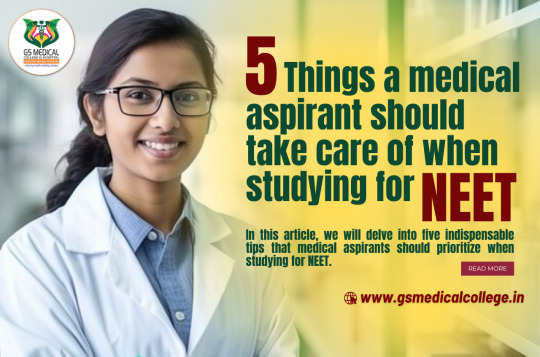
Mastering NEET Preparation: Essential Tips for Success
Essential Tips for Success provides invaluable guidance on excelling in the NEET exam and includes a comprehensive list of private medical colleges in UP.
Tip 1: Understanding the Exam Pattern and Syllabus
Exam Pattern: Familiarizing yourself with the NEET exam pattern is crucial for effective preparation. The exam consists of multiple-choice questions (MCQs) from Physics, Chemistry, and Biology (Botany and Zoology). Understanding the structure of the exam, including the distribution of questions among the subjects, can help you tailor your study approach accordingly. Additionally, grasp the marking scheme, which entails allocating marks for correct answers and applying penalties for incorrect ones. This understanding will guide your exam strategy, ensuring optimal performance on test day.
Syllabus: Thoroughly reviewing the NEET syllabus is fundamental to covering all the requisite topics. The syllabus is based on the NCERT curriculum for classes 11 and 12, encompassing a wide array of subjects and chapters. Focus on important topics and chapters within each subject, as outlined in the official NEET syllabus. Prioritize your study efforts based on the weight age of topics and their relevance to the exam. By meticulously studying the syllabus, you can ensure comprehensive coverage of all essential concepts and maximize your chances of success.
Tip 2: Developing a Structured Study Plan
Time Management: Crafting a structured study plan is paramount for effective time management during NEET preparation. Allocate specific time slots for each subject and topic, considering their importance and complexity. Prioritize difficult topics or areas where you need improvement while ensuring coverage of the entire syllabus. A well-planned study schedule enables you to make efficient use of your time and maintain a balanced approach to studying.
Consistency: Consistency is key to achieving success in NEET preparation. Adhere to your study plan diligently, avoiding procrastination and distractions. Break down your study sessions into manageable chunks to prevent burnout and maintain focus throughout. Consistent and disciplined study habits foster a conducive learning environment, allowing you to retain information effectively and progress steadily towards your goals.
By incorporating these essential tips into your NEET preparation strategy, you can enhance your readiness and performance on the exam day. Embrace a systematic approach to studying, prioritize strategic time management, and maintain consistency in your efforts to optimize your chances of achieving success in NEET.
Tip 3: Utilizing Effective Study Resources
Textbooks: Utilizing standard textbooks recommended for NEET preparation is essential for comprehensive understanding of the subjects. NCERT books for Biology, Chemistry, and Physics are highly recommended due to their alignment with the NEET syllabus. These textbooks provide a solid foundation of fundamental concepts and serve as a primary resource for building knowledge.
Supplementary Resources: In addition to textbooks, supplement your study material with reference books and study guides authored by subject matter experts. These supplementary resources often provide in-depth explanations, practice questions, and additional insights into complex topics. Choose reputable reference materials that complement your learning style and help reinforce key concepts.
Online Resources: Take advantage of the plethora of online platforms offering NEET preparation materials. These resources include mock tests, practice questions, video lectures, and study notes, providing flexibility and accessibility for students. Explore reputable websites and educational platforms that offer high-quality content tailored to NEET preparation. Engage with interactive study materials and utilize digital resources to enhance your understanding and retention of concepts.
Participation in Online Communities: Engage with online forums or discussion groups dedicated to NEET preparation to interact with peers and educators. These online communities provide opportunities for collaborative learning, sharing of study strategies, and clarification of doubts. Actively participate in discussions, ask questions, and contribute to the community to enhance your learning experience. Leveraging the collective knowledge and support of fellow aspirants can foster a supportive learning environment and motivate you to stay focused on your goals.
Tip 4: Practicing Regularly with Mock Tests
Mock Tests: Regular practice with mock tests is indispensable for NEET preparation as it simulates the exam environment and assesses your readiness. Allocate dedicated time for taking mock tests and adhere to exam-like conditions by setting a timer and following the exam pattern and marking scheme. Choose reputable sources for mock tests that accurately reflect the difficulty level and format of the actual NEET exam.
Analysis of Performance: After taking mock tests, thoroughly analyze your performance to identify strengths and weaknesses. Review the questions you answered incorrectly or struggled with to understand the underlying concepts. Pay attention to recurring mistakes and areas needing improvement, and prioritize them in your study plan. Use mock test analysis as a diagnostic tool to tailor your study approach and focus on areas that require additional practice.
Adjusting Study Plan: Based on the insights gained from mock test analysis, make necessary adjustments to your study plan. Allocate more time for revisiting weak areas and practicing questions in topics where you struggled. Incorporate targeted revision sessions and focused practice to reinforce concepts and improve performance. Regularly monitor your progress through mock tests and refine your study plan accordingly to ensure steady improvement.
By utilizing effective study resources and practicing regularly with mock tests, you can enhance your NEET preparation and increase your chances of success on the exam day. Adopt a systematic approach to studying, leverage a diverse range of resources, and continuously evaluate your progress to optimize your performance in NEET.
Tip 5: Prioritize Physical and Mental Well-being
Maintaining a healthy lifestyle and managing stress are essential components of effective NEET preparation. Here are some strategies to take care of your physical and mental well-being during your study journey:
Healthy Lifestyle: A balanced diet rich in nutritious foods is crucial for sustaining energy levels and cognitive function. Include a variety of fruits, vegetables, whole grains, lean proteins, and healthy fats in your meals to fuel your body and brain. Avoid excessive consumption of processed foods, sugary snacks, and caffeinated beverages, as they can negatively impact your focus and energy levels.
Staying hydrated is equally important for optimal brain function and overall well-being. Aim to drink plenty of water throughout the day to maintain hydration and prevent fatigue.
Regular exercise is beneficial for both physical and mental health. Incorporate moderate-intensity activities such as walking, jogging, cycling, or yoga into your daily routine to improve circulation, reduce stress, and enhance mood. Even short bursts of physical activity can boost concentration and productivity during study sessions.
Adequate sleep is essential for memory consolidation, cognitive function, and overall well-being. Aim for 7-9 hours of quality sleep each night to ensure optimal rest and recovery. Establish a consistent sleep schedule and create a relaxing bedtime routine to promote restful sleep.
Stress Management: Stress and anxiety are common during exam preparation, but effective stress management techniques can help alleviate these feelings and improve overall well-being.
Practice deep breathing exercises, meditation, or progressive muscle relaxation to promote relaxation and reduce tension. Incorporate these techniques into your daily routine or use them as needed during stressful moments.
Engage in activities that bring you joy and relaxation, such as listening to music, spending time in nature, or pursuing hobbies. Taking breaks from studying to engage in enjoyable activities can help rejuvenate your mind and reduce stress levels.
Set realistic goals and prioritize tasks to avoid feeling overwhelmed. Break down large study sessions into smaller, manageable chunks, and focus on one task at a time. Celebrate your accomplishments, no matter how small, and acknowledge your progress along the way.
Connect with supportive friends, family members, or mentors who can offer encouragement, guidance, and perspective during challenging times. Sharing your feelings and experiences with others can provide emotional support and help you maintain a positive outlook.
By prioritizing your physical and mental well-being, you can enhance your resilience, manage stress more effectively, and maintain peak performance throughout your NEET preparation journey. Remember to listen to your body, take breaks when needed, and practice self-care to optimize your overall health and success on exam day.
Conclusion:
For NEET aspirants, integrating the mentioned qualities into their daily routines is crucial, especially when examining MBBS colleges in Uttar Pradesh. By making healthy lifestyle choices, managing stress effectively, and prioritizing self-care, you can create a supportive environment for successful exam preparation. Cultivating these habits not only enhances your physical and mental well-being but also influences your brain to function optimally during study sessions. Consistency in practicing these habits will train your brain to adapt to a conducive environment for learning and improve your decision-making abilities. Through the development of these traits in your daily regimen, you'll be better prepared to meet the demands of NEET preparation and tackle the exam with confidence and insight, especially at Private Medical Colleges in Delhi NCR.
#MedicalAspirant hashtag#StudyingForNEET hashtag#MedicalCollege hashtag#MBBSCollege hashtag#GSMedicalCollege hashtag#DelhiNCR hashtag#UttarPradesh hashtag#India
0 notes